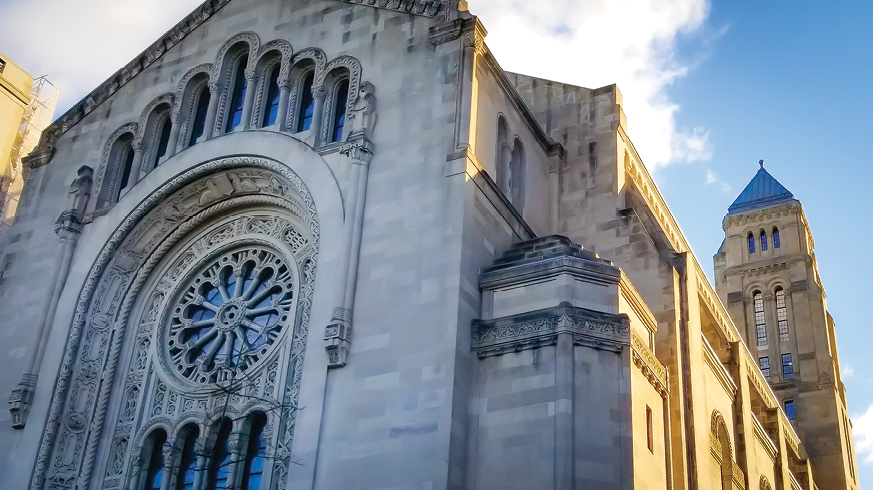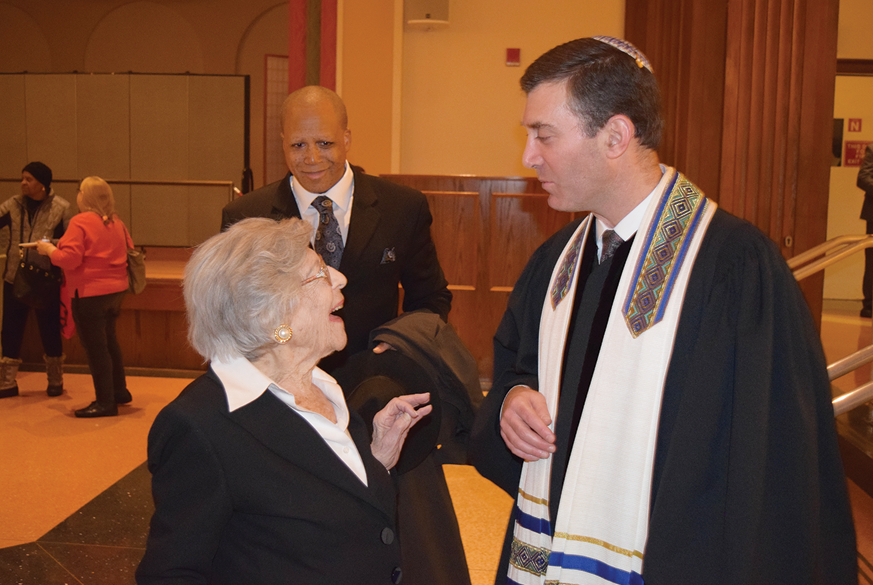- Home
- Media Kit
- MediaJet
- Current Issue
- Past Issues
- Ad Specs-Submission
- Ad Print Settings
- Reprints (PDF)
- Photo Specifications (PDF)
- Contact Us
![]()
ONLINE
![]()
ONLINE

A Servant of the Community
Editors’ Note
Rabbi Joshua Davidson holds the Peter and Mary Kalikow Senior Rabbinic Chair of Congregation Emanu-El of the City of New York. From 2002 through 2013, he served as senior rabbi of Temple Beth El of Northern Westchester in Chappaqua, New York, and from 1997 to 2002 as assistant and associate rabbi of Central Synagogue in New York City, advising that synagogue’s award-winning Social Action Committee. A graduate of Princeton University and ordained by the Hebrew Union College-Jewish Institute of Religion, Rabbi Davidson’s work has included anti-death penalty advocacy, LGBTQ inclusion, and interfaith dialogue. In 2009, he was honored for his interfaith efforts by the Westchester Jewish Council and the American Jewish Committee, on whose New York Board he sits. Currently, Rabbi Davidson chairs A Partnership of Faith in New York City. He is a member of the Hebrew Union College Board of Governors, HUC’s President’s Rabbinic Council, the Clergy Advisory Board of Interfaith Impact of New York State, the Board of UJA-Federation of New York, and the Muslim-Jewish Advisory Council. He is a past president of both the Westchester Board of Rabbis and the Chappaqua Interfaith Council. From 2001 to 2006, he served as chair of the Central Conference of American Rabbis’ Committee on Justice, Peace and Religious Liberties and vice-chair of the Commission on Social Action of Reform Judaism. He also chaired the Commission’s task force on Israel and world affairs. He is a past board member of Rabbis for Human Rights-North America. Rabbi Davidson was honored with a Corkin Family Fellowship at the Herbert D. Katz Center for Advanced Judaic Studies at the University of Pennsylvania and Clal-The National Jewish Center for Learning and Leadership. His articles have appeared in The Jewish Week, Commentary Magazine, The New York Times, the New York Post, the Jerusalem Post, The Times of Israel, and The Huffington Post. He is a contributing writer in Rabbi Lawrence Hoffman’s Prayers of Awe series. Over the last decade, Rabbi Davidson has guided Congregation Emanu-El through a revisioning to meet the needs of the 21st century.
Temple Brief
Established in 1845, Temple Emanu-El (emanuelnyc.org) is more than an architectural landmark, a storied synagogue, and leader within American Judaism. It’s also a caring community whose members are devoted to lifelong learning, spiritual growth, and social justice. Known for its grand architecture, warm community, and bold programming, Temple Emanu-El is a standard bearer for Reform Judaism in the United States. Its Fifth Avenue Sanctuary is globally renowned for its size and majesty and, each year, thousands of visitors from around the world travel to New York City to experience Emanu-El.

Temple Emanu-El at One East 65th Street in Manhattan
Will you highlight the history of Temple Emanu-El and how the institution has evolved?
Temple Emanu-El was one of the early Reform congregations in the United States. Reform Judaism emerged out of the Western European Enlightenment. It was driven by universal values with a focus on how Jewish ethics spoke in universal tones and in ways that the Jewish community might apply those values to integrating into and serving the wider world. Emanu-El was, and remains, proudly a part of that. Over the course of the generations, the Reform Jewish community in the United States began to reincorporate some of Judaism’s more traditional rituals, such as more Hebrew in prayer. Traditions that set us apart and made us unique unto ourselves began to find their expression in new ways within Reform Jewish life – and so too within Temple Emanu-El. There is a bit more Hebrew in the service, and some of the rituals, once rejected, are now welcome, such as wearing a tallit (prayer shawl) and a yarmulke (head covering). But even as we embrace these rituals, we pursue the universal values that give meaning and purpose to Jewish life.
How critical is it for Temple Emanu-El to continue to attract and engage young people into its congregation as you look to the future?
The country is aging, so it is not a surprise that the demographics of its religious communities are also aging. Though a generalization, it is also fair to say that younger generations are not “joiners” the way older generations were. It used to be that the reflexive response to Jewish identity and commitment was to join the local temple, which is not the case in quite the same way among younger generations. They are, with every right to be, individualists in the choices they make, and every institution needs to prove its worth and show its value.
We know that there are many, many thousands of young Jewish professionals and young Jewish families who are living in New York City. They are selective about the decisions they make regarding affiliation, and a synagogue needs to figure out how it can add meaning and value to their spiritual experience. One of the things that Emanu-El has tried to do during the time that I have been here is to open as many doorways into synagogue life as we can. Mordecai Kaplan, known as the founder of Reconstructionist Judaism, wrote in the 1930s responding to a wave of assimilation in the American Jewish community that Jewish institutions need to recognize that Jews identify as Jews in myriad ways – it may be through ritual and study, but it also may be through politics, food, visual arts, dance, drama, or music. For a Jewish institution to thrive, it has to engage people in all these ways, so we have tried at Emanu-El to create a cultural education center. Worship and the study of the Torah will always be at its core – these give meaning to who we are as a people – but we have worked over the past decade to reach people in as many ways as possible. We opened up a campus in Chelsea specifically for young families living in that neighborhood, and we have taken our Young Professionals programming to new heights. In order to remain vital and vibrant, you need to figure out how to bring in the next generation.

Rabbi Davidson with a member of Congregation Emanu-El
How concerned are you about the rise of anti-Semitism across the country and what can be done to effectively address this issue?
Anti-Semitism is a complicated topic because it comes at us from different directions. Most people say that we need to worry about the white nationalists and neo-Nazis, and we do; but we also have to worry about those whose hatred of Israel is really a cover for their hatred of Jews. So it comes at us from the right and it comes at us from the left, and the same solutions do not apply to all. I would say that there are three strategies in common that do apply no matter where anti-Semitism comes from. First is education – we need to educate the Jewish community about what anti-Semitism is so that they are able to identify it even in its veiled forms and stand up to it, and we also need to educate the non-Jewish community so that they are more aware of Jewish history. Second is building relationships – the Jewish community needs to continue to build relationships with other communities who are also targets of hate, whether it is the Black community, the Asian community, the Muslim community, the gay community, or others. We can be allies for each other. Third is the need to stand up to anti-Semitism and not be intimidated by it. For example, there was recently a national day of hate that was sponsored by a neo-Nazi group. What we did on that day, a Saturday morning, was move our Shabbat service outside onto Fifth Avenue because I wanted people to see that we would not be cowed. We have to stand up to the hate.
Did you know at an early age that you wanted to pursue a career as a Rabbi?
My father, Jerome Davidson, is a rabbi. For more than 40 years, he led Temple Beth-El of Great Neck, and is now retired. He remains the best role model that I could have ever had. My mother, Gail, is also very accomplished in her field and holds a PhD in Art History. They never pressed me in any direction and wanted me to find my own way. Having said that, seeing my father’s experience and impact within the congregation and in the wider community made me view becoming a rabbi very positively. Then I went off to college and thought I might be a journalist, since I was interested in sportscasting. After college, I remember recording tapes of a baseball game and I sent them out to every minor league team that I could find an address for. I got back 20 rejection letters, but I did not give up. I actually got an internship at CNN, and I was enjoying it immensely because of the people I was working with. While I was there, I received an offer from Rabbi David Gelfand who had been my father’s assistant rabbi in Great Neck. Rabbi Gelfand was serving a synagogue in Cleveland and he asked if I would be interested in coming out to Cleveland to be the youth advisor at the synagogue and do some teaching. I remembered how much fun I had being a part of the congregation and the youth group at Temple Beth-El while growing up, so I decided to go to Cleveland and give it a try.
I was having a great time and after a couple of months, I realized that this was the path I wanted to pursue. I applied to the Hebrew Union College and began my journey. That was the start of a truly rewarding and fulfilling career.
How valuable has it been to have such engaged leadership at Emanu-El as well as such a talented and committed team working with you?
It has been critical. A rabbi is a servant of the community – that is what I try to be. I serve the Jewish people. I serve God through them, and hopefully through my service to God and the Jewish people, I am able to serve the wider world. As for leadership, the right to lead depends on a commitment to serve. Any leadership role that Emanu-El might play in the wider community has to have the support of the congregants. They have to feel proud of what the temple represents. And I remain in constant communication with the wonderful president of Emanu-El who is in regular communication with an equally wonderful board of trustees. Ultimately, it is their congregation.
You can’t do anything without a fantastic staff. We have a great team, including my colleagues in the clergy, our educators, program directors and those who steward our resources and historic campus. I am so grateful for the commitment and talent that they each bring to Emanu-El. None of what we do could happen without them.
In your role, you are a part of some of the greatest moments in the members of your congregation’s lives, as well as some of their most difficult times. How do you manage the emotional aspect of the role?
There are some days that are emotionally exhausting – days that you go from the highest of highs to the lowest of lows. This can be very difficult and very painful. That said, I think for those of us who chose to become pastors, we made that choice because we find meaning and fulfilment in being part of those moments. That gives us some strength and uplift, knowing that we can help people in those moments, even those that are terribly sad moments.![]()